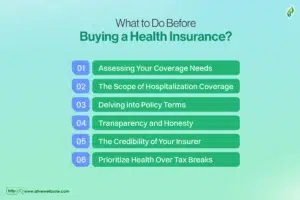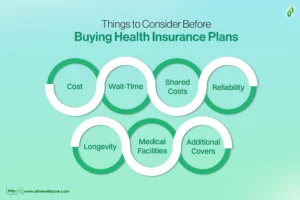Last Updated on November 13, 2024 by Helena Akter
Deciding on the right individual health insurance policy is crucial, not just for peace of mind, but for your pocket too. Since there are tons of options, some better than others, so choosing one is hard.
That’s why it’s vital to understand the “Do’s and Don’ts When Buying Health Insurance Policy.” In the next few paragraphs, we’ll dive deep into the essentials, offering you the best insights to make an informed decision.
So, let’s kickstart your journey to health security!
What to Do Before Buying a Health Insurance?
It’s a big mistake to neglect your preparations before buying health insurance. You must know a few to-do’s beforehand and they’re discussed below —

1. Assessing Your Coverage Needs
To begin with, it’s important to gauge how much financial backing you’ll need. Look, health emergencies are unpredictable. While some might just need a quick visit to the doctor, others may require extended hospital stays.
That’s why reflect upon your family’s needs and future scenarios. An often-quoted insurance rule suggests a coverage amount that’s five to ten times your yearly salary.
While this isn’t a one-size-fits-all rule, it offers a good starting point.
2. The Scope of Hospitalization Coverage
Insurance policies vary significantly in what they offer. A few policies cover all possible medical expenses, including surgery and overnight hospital stays, prescription medicines, and room rentals.
Conversely, other policies might cap the payout for each category. For example, one policy may cover surgical expenses in full, but another may cover a limited amount, leaving you on your own.
Given the potential cost implications, it’s crucial to draw comparisons. Thus, look beyond attractive premiums; delve into the specifics of what’s included and what’s not.
3. Delving into Health Insurance Policy Terms
Every insurance policy comes with its share of disclaimers which begs you to know the secrets to finding health insurance deals. While they might seem mundane, they carry significant weight —
- Pre-hospitalization Cover
Essentially, it relates to the window during which the insurer will bear the patient’s medical expenses before they’re formally hospitalized.
- Post-hospitalization Cover
Post-being discharged, it outlines the duration the insurer will continue to cover subsequent medical expenses.
- Pre-existing Conditions
A critical clause refers to injuries or conditions you were diagnosed with prior to the insurance’s initiation. Some policies require a ‘waiting period’ before these conditions come under the coverage umbrella.
- Exclusions
Every policy will have its no-go zones—areas it won’t cover. This section, typically embedded in the fine print, merits keen attention.
4. Transparency and Honesty
While it might seem tempting to skip over certain health facts hoping for lower premiums, it’s a gamble that can cost you dearly. Misrepresenting or omitting health details can render your policy void.
The worst, if discovered during a claim process, the insurer can refuse to pay out, leaving you in a financial lurch.
5. The Credibility of Your Insurer
Beyond the policy, the insurer’s reputation plays a pivotal role. Their past performance, specifically their claim settlement ratio, offers insights into their reliability.
A consistently high ratio is a good indicator of an insurer who stands by its commitments.
6. Prioritize Health Over Tax Breaks
Some view health insurance as merely a tax-saving tool. Now, this approach is myopic! Here, your core intent should be safeguarding against health adversities.
That way you’ll not only ensure peace of mind but also anchor your financial planning, steering you clear of sudden, hefty medical bills.
What Mistakes to Avoid When Buying Insurance?
Insurance is like a safety net for life’s unpredictable moments. But often, while buying insurance, people make errors that can later prove costly.
We’ll look at common insurance mistakes and how you can avoid them.

1. Underestimating Basic Coverage Needs
Insurance isn’t just a piece of paper; it’s protection. Everyone should have at least the fundamental level of coverage.
Think about it: If your car gets stolen or if you’re involved in an accident, basic insurance can be a lifesaver.
Moreover, even a simple health insurance plan can help reduce your medical bills significantly. If comprehensive plans seem too much, go for plans with a higher deductible.
It’s essential to note, especially in places like the U.S., that having health insurance is mandatory. Skipping it can lead to penalties during tax season. Always ensure the insurance you choose offers coverage for the essentials, like in situations of severe illness or disabilities.
2. Overspending on a Policy
While it’s essential to have insurance, it doesn’t mean you should break the bank for it. Especially when you’re younger and have fewer assets, you might not need an ultra-premium plan.
It’d be best if you talk to an expert, discuss your needs, and pick something that offers good coverage without being overly pricey.
3. Skimping on Coverage
On the flip side, getting too cheap and underinsuring can backfire. So, it’d be best if you know how to lower your health insurance costs and ensure your plan can comfortably cover potential costs.
For instance, if an unfortunate accident occurs, your insurance should cover the subsequent medical bills without any hitches.
And while a million-dollar coverage might seem adequate for many, remember, serious illnesses can spike costs quickly.
4. Choosing the Wrong Type of Plan
It’s like wearing winter boots to a beach party. Having an insurance type that doesn’t fit your needs is just pointless. Some types of insurance might not be needed by the younger population, particularly those under 30.
It’s crucial to assess your requirements and choose a plan that aligns with them.
5. Sticking to One Option
There’s a saying that “Don’t put all your eggs in one basket.” The insurance market is vast, with various offerings that can suit different needs and budgets.
So, it’s not a bad idea to reevaluate your insurance from time to time and compare it to other options. Some plans even offer professional or location-based discounts.
That being said, a periodic market scan can be both eye-opening and wallet-friendly.
Things to Consider Before Buying Health Insurance Plans
As humans, we are bound to get sick, as it’s a natural part of our existence. And getting health insurance is a must-have backup plan. That’s why you should keep a few things in mind before buying a health insurance plan.

- Cost: What’s the premium you’ll be paying?
- Wait-Time: How long before the coverage kicks in for pre-existing issues?
- Shared Costs: Is there a co-payment involved?
- Reliability: What’s the claim payout record of the insurance company?
- Longevity: Until what age can you renew the plan?
- Medical Facilities: Which hospitals are within their network?
- Additional Covers: Do they offer options for critical illnesses or other extras?
How to Choose the Right Sum Insured for Your Health Insurance?
Making an informed choice in health insurance isn’t just about protection against unforeseen health issues; it’s also about peace of mind. Plus, if you’re running a small business, it’ll assure your employees as well.
Thus, choose an insurance sum according to —
1. Life Phases
When life changes as it does such as when one ages, gets married, or plans to have kids, the need for insurance increases.
2. Family Needs
Covering multiple family members? You’ll need a bigger amount.
3. Personal Health
A history of illnesses or hereditary diseases means a more substantial coverage.
4. Lifestyle Choices
A life filled with stress, adrenaline sports, or fast-paced routines increases health risks. That’s why plan accordingly.
Final Words
It’s clear that picking the right health insurance policy requires a blend of caution, understanding, and foresight. It’s not just about finding the cheapest or most advertised policy.
It’s about finding what fits you. Remember, insurance is your shield against unforeseen medical expenses. Always keep in mind the do’s and don’ts when buying a health insurance policy as your compass.
Because, at the end of the day, your health is your wealth. Protect it wisely.
FAQs
1. How can I prevent mistakes and pick the best health insurance plan?
Well, surfing the web is your easiest and best approach. You can compare and find a plan that covers all your needs, doesn’t break the bank, and won’t give you headaches when claiming.
2. Which type of insurance is the most valuable?
You should consider life insurance. Why? Because life’s unpredictable! The whole idea is to keep your family financially secure if, you know, things go south.
And remember, there’s a term and whole life insurance to decide between.
3. What can I do to prevent my health insurance claim from being rejected?
Always hand over every medical paper you’ve got to your TPA promptly. And, before you hit that submit button, double-check your claim form. Details make all the difference!

